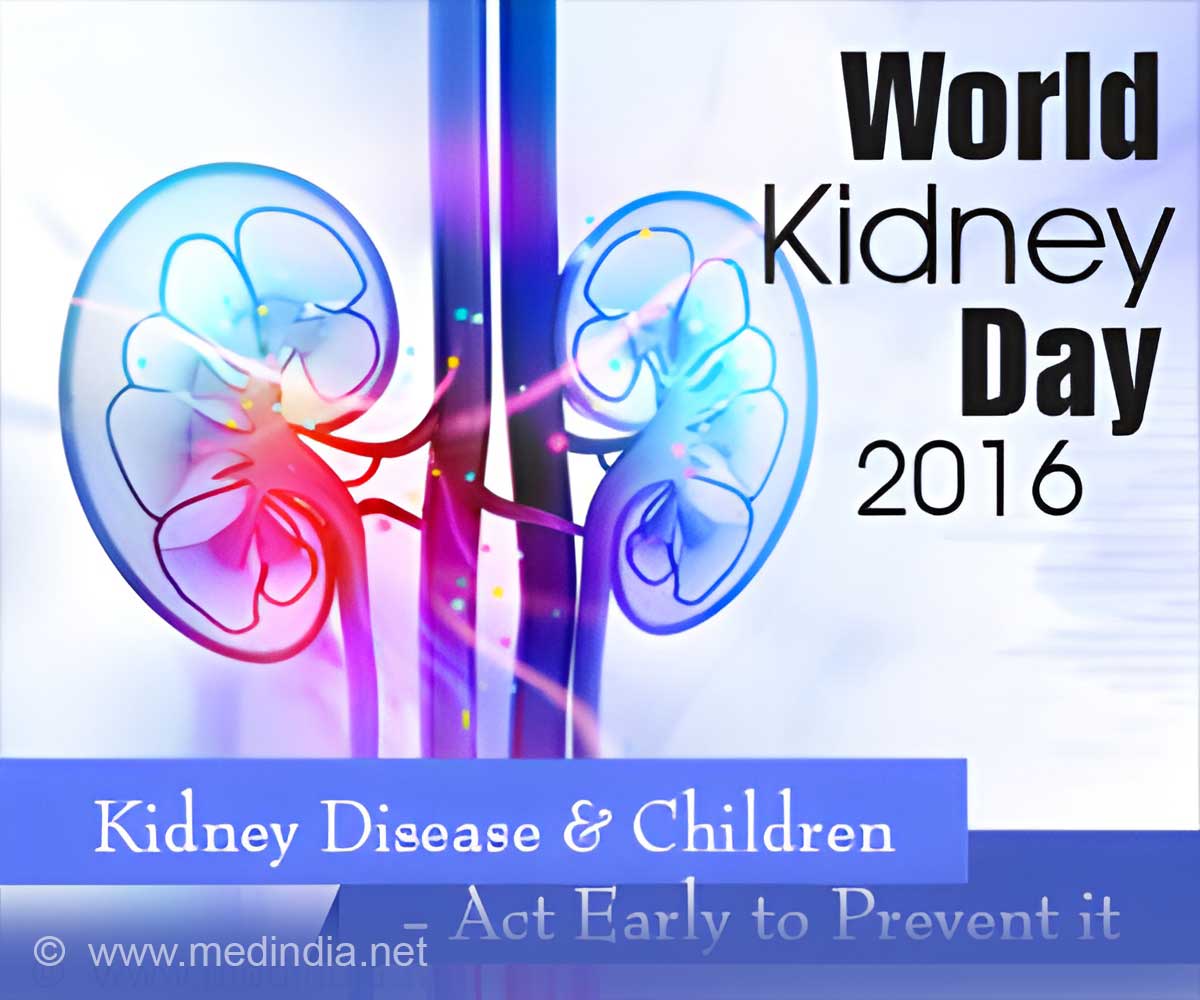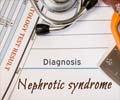World Kidney day 2016 is being celebrated on 10th March with the theme 'Kidney Disease and Children - Act Early to Prevent It'.

- The reported incidence of children requiring dialysis or transplantation in the world is reported as 9 per million of the age-related population (4–18 years)
- The chance of survival of a child with end stage kidney disease is 30 times lower than that of their healthy peers.
- Congenital disorders of the urinary tract and hereditary nephropathies, are responsible for about two thirds of all cases of chronic kidney disease in developed countries.
- Children with kidney disease are more likely to die of of cardiovascular causes and infection rather than from kidney failure.
Symptoms of Kidney Disease in Children
Among children, it is difficult to ascertain the presence of kidney disease due to the absence of easily noticeable symptoms that are normally associated with kidney disease like swelling, elevated blood pressure or red blood cells in urine (hematuria). The symptoms of kidney disease among children are a lot more subtle. Moreover, a physician is more alert to the prospect of kidney disease in an adult rather than a child, hence the index of suspicion may not be as high and this results in the diagnosis getting missed out.The Symptoms associated with kidney disease include:
- Swelling/ puffiness of hands and feet.
- Reduced appetite.
- Fever, nausea or giddiness.
- Prolonged changes to the color of urine like the reddish brown color.
- Unusually smaller height and weight when compared to peers.
- Loss of bladder control.
Causes of Kidney Disease Among Children
The leading causes of kidney disease among children are:- Congenital anomalies of kidney and urinary tract
- Hereditary nephropathies
- Glomerulonephritis
The kidneys are essential organs that are necessary for good health among children as well as adults. In the advent of a kidney disease, the kidney fails to function at optimum efficiency resulting in symptoms of kidney damage. The following are functions of the kidney that are affected in a kidney disease:
- Waste removal: The kidney aids in removing waste from the body and when the kidney function drops, there is a toxic build up of waste. This can lead to swelling of hands and feet and feeling of nausea.
- Hormone production: The kidney fails to release hormones that are necessary for the optimum growth of the child, maintenance of blood pressure, bone development and for the production of red blood cells (leading to anemia).
- Maintaining optimum levels of calcium, potassium, sodium and phosphorous.
- Maintaining acid-base balance in the body.
Dr Rajan Ravichandran, renowned Nephrologist and current Director of MIOT Hospitals,Chennai lists 3 key identification factors that guide doctors in spotting kidney disease among children.
- Urinary infection among babies: When a baby of less than a year, shows symptoms of urinary infection like fever, poor feeding, being very tired, then kidney defect due to congenital abnormality could be a reason as the chances of the baby acquiring urinary infection are minimal. The earlier it is detected, the better the chances of avoiding kidney failure.
- IgA Nephropathy: These are allergic diseases that go unnoticed, but Japanese school children are frequently tested for the presence of albumin and RBC in the urine to detect the presence of kidney damage.
- Lifestyle factors: Obesity and hypertension are major factors that lead to kidney disease. The detection of obesity can be used as a marker to check for the presence of kidney disease if the child also shows elevated blood pressure.
Dr Rajan Ravichandran says that a team of researchers from his hospital conducted a study to assess the health status of college students and it was found that 6% of college students were hypertensive while 18% were obese, underlying the alarming level of threat among children and young adults.
- Childhood Obesity: Lifestyle factors like excessive T.V viewing and the ‘couch potato’ behavior have led to increase in childhood obesity. Intake of junk foods and salt rich food are other contributing factors for childhood obesity. These factors lay additional stress on the kidneys and increase the risk for kidney disease.
- Childhood hypertension: Hypertension among children is a largely missed symptom as nobody really checks the blood pressure of children. This could be due to the perception that children are hyperactive and, therefore, have higher BP or that hypertension is not present among children.
Kidney Disease Challenges for Children
Children with chronic kidney failure face many challenges at home, school and with friends and these include -- Learning problems in school
- Trouble concentrating and remembering facts
- Delay in development of language skills
- Delay in development of motor skills
- Problems with relationship
- A negative self-image – due to delay in growth, urinary incontinence, inability to participate in sporting activity
Seeking Help for Children with Kidney Disease
The doctor who treats the child may not provide the necessary support for the child and the parents but it is worth asking him if there are counsellors, dieticians, social workers and specially trained psychologist who can be consulted.Support groups if available can do a lot of good for the child, however these may not be easily available everywhere but a few online groups may help with literature that the parents could use to educate themselves and help the child.
Parents of children should be encouraged to form support groups by doctors and organize regular meetings and appoint trained staff to attend these meetings and support the group with advice.
Precautions During Summer Months
Here are precautions to safeguard your kidneys this summer.- Drink plenty of water: Hydration is essential to maintain water balance in the body and to ensure proper functioning of the kidney. Children tend to be too busy playing that they seldom realize the need to drink water, parents need to step in to ensure that their wards are well hydrated.
- Teach children to use the restroom: Children, especially those going to school, tend to hold back from using the school toilet and empty their bladder only when they get back home. This is a common behavior, but one that can lead to infections in the urinary tract or even the kidneys. This practice should be avoided and children should be taught to pass urine when they need to. If there are concerns regarding the hygiene of the school toilet, then parents must step in and contact the school administration to set it right. It is highly imperative that there are no hindrances for a child.
- Encourage movement of feet: In this technology age, when i-pads and PlayStation (PS4s) are the main sources of entertainment, children should be actively encouraged to play outdoors. This will aid in maintaining weight and will also help in lowering the stress on the kidneys.
- Infections: Malaria and dengue spread extensively during the summer months and these infections could also potentially affect the kidneys. Therefore, care should be taken to protect people from these infections this summer.
- Avoid unnecessary antibiotic and use of analgesics: Rampant and un-prescribed antibiotics for normal cold and cough or short episodes of fever should be avoided as they can increase the risk of kidney damage. Similarly analgesics should be used with caution and only where required and for a short time.
- Avoid eating out (or) contaminated food: The heat during summer tends to spoil food a lot faster than at other times of the year. This would mean that people are at a greater risk of eating spoiled food. Moreover, eating at small food joints could increase the risk of eating contaminated food. Eating spoilt or contaminated food can lead to gastroenteritis (inflammation of stomach and intestines) and dehydration, which in turn affect the kidneys.
References:
- https://www.kidney.org/atoz/content/hbpchildren
- http://www.niddk.nih.gov/health-information/health-topics/kidney-disease/overview-of-kidney-disease-in-children/Pages/index.aspx
- http://www.niddk.nih.gov/health-information/health-topics/kidney-disease/facing-the-challenges-of-chronic-kidney-disease-in-children/Pages/facts.aspx
- Pediatr Nephrol. 2012 Mar;27(3):363-73. Epidemiology of chronic kidney disease in children. Harambat J1, van Stralen KJ, Kim JJ, Tizard EJ.
- http://www.healthinfonet.ecu.edu.au/chronic-conditions/kidney/reviews/kidney_review
- http://www.worldkidneyday.org/
Source-Medindia















